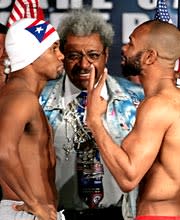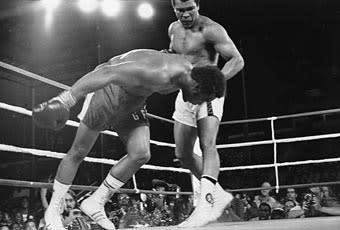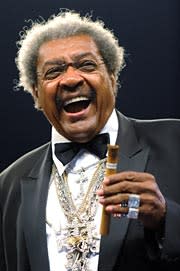King won't go down without a fight
Las Vegas is not such a great place to live these days. About the only thing higher than the city's skyrocketing unemployment rate are the points being allowed by the dreadful UNLV football team.
You can't drive more than two blocks, it seems, without passing a home that has been foreclosed. Home values have plummeted 50 percent and more. Restaurants, shops and businesses have closed more quickly than they were built during the boom only a few short years ago.
Foot traffic in the casinos, which is the lifeblood of the city, is sparse. Hotel room rates in many of the city's finest establishments are at 1990 rates.
The Floyd Mayweather Jr.-Juan Manuel Marquez fight was a hit on pay-per-view television, selling an unexpectedly high 1 million subscriptions. But the MGM Grand Garden Arena wasn't sold out and the frenzy for the event, so palpable in the not-so-distant past, was missing.

Don King promoted the January 2008 bout between Felix Trinidad and Roy Jones Jr., which lost millions.
(AP Photo/Bebeto Matthews)
Into this breech has walked Don King, the once-ubiquitous boxing promoter whose business the past few years has gone the way of the Las Vegas economy. King hasn't promoted a truly major fight in years.
He's co-promoted a few cards and he put on the 2008 bout between Felix Trinidad and Roy Jones Jr. which lost millions and was years late in occurring.
Lately, though, he's been silenced by what he says is an inability to get a date on one of the premium cable networks. He boasts that he has 12 world champions under promotional contract, adding: "And that's doing nothing."
He's hardly ready to give up and go quietly into retirement. He's just as active at 78 as he was at 58, though he's been downsizing his company and hasn't been as visible as he was a decade ago when his face was synonymous with a major event.
King has hatched a plan to turn Las Vegas back into a boxing town – and he's going to the grassroots level to do it. He's had an amazing ability to adjust over the years, but this adjustment is as big as he's done.

Phil Ruffin
He's partnered with Phil Ruffin, a billionaire developer who recently purchased the Treasure Island from corporate giant MGM Mirage, to promote a bantamweight championship fight between Joseph Agbeko and Yohnny Perez on Halloween night at the casino.
He longs for the days when the casinos were owned by individuals and worked together with boxing promoters to create a buzz around an event.
King said boxing in Las Vegas circa 2009 has become like a corporate hospitality tent at a golf tournament. It's all about marketing schemes and corporate sponsors and not about pitching a hot fight to passionate fans.
Some of the great fights of the past 25 years have come on King undercards. He was notorious – particularly when promoting former heavyweight champion Mike Tyson – for putting on shows with 14 bouts and as many as six world championship matches.
There were absolute wars on those undercards which were witnessed by only a handful who managed to stumble into the arena a little after two in the afternoon.
He said Las Vegas boxing today is about packaging one fight. Casinos don't cooperate with each other and rarely support another's fight.

Challenger Muhammad Ali downs defending world champion George Foreman on Oct. 30, 1974, in Zaire, a bout dubbed "Rumble in the Jungle," promoted by King.
(AP Photo)
King saw it work in the 1970s and 1980s and doesn't understand why the old approach won't work today. He's promoting the event a day after the 35th anniversary of perhaps his biggest promotion, "The Rumble in the Jungle," in which Muhammad Ali knocked out George Foreman for the heavyweight title in Kinshasa, Zaire.
"The lure of Las Vegas has always been everybody coming out to get rich quick," King said. "Don't forget the story of the guy [Fred Smith] who founded FedEx. He was about to go belly up and he went to Caesars Palace and he won [$27,000] and had enough money to pay his bills. Now, FedEx is one of the biggest things out there, taking the mail, bringing it back. Taking a package, bringing it back. That is the lure of what Las Vegas was: Humphrey Bogart, Peter Lorre, James Cagney.
"You had the biggest stars in the world on the Strip. The money, the food, the shows, the stars – this was the lure and the seducement of what Las Vegas was. All the wise guys coming in, everyone coming to play. Lauren Bacall, big things happening, a lot of excitement. I'm trying to recapture that.
"In hard times," King added, "you make it better. Gambling is supposed to be bigger and better. All these corporate places now, they treat people like they're robots instead of treating them like they're human beings. This is where you lose out, man."
He still loves the action and he craves being in the middle of the big deal. He was one of the first boxing promoters to recognize the potential of mixed martial arts and in 2006 was talking about buying into the now-defunct World Fighting Alliance.
That organization was owned by Ross Goodman, the son of Las Vegas' popular mayor, and had fighters such as Ultimate Fighting Championship light heavyweight titleholder Lyoto Machida and former champion Quinton "Rampage" Jackson under contract.
King said Goodman panicked, causing the deal between the men to fall apart. Goodman sold the WFA's assets to the UFC, where Jackson and Machida became major stars.

King is awarding $1,000 to the best Don King lookalike at the Halloween bout between Joseph Agbeko and Yohnny Perez at Treasure Island.
(Harry How/Getty Images)
King hasn't put MMA entirely out of his mind, though he heaped praise on the UFC and the way it has marketed and promoted fights. He said the UFC's success isn't a death knell for boxing but rather proves that people want to see good fights and get value for their money.
He also pointed to the success of Mayweather's fight on pay-per-view and in movie theaters around the country as another example of how boxing can work.
"That shows that people will go out for a good fight or for a name," King said. "It was a tremendous thing and shows that boxing is healthy and alive. Now there are people who want to say that the UFC is going to kill boxing. I would respectfully disagree.
"[UFC president] Dana White is a phenomenal promoter, a brilliant guy. He's got you all pumped up that this guy hates that guy and you need all this security between them because they want to kill each other and he promotes it and he makes you desperate to want to see that.
"Dana White and Lorenzo Fertitta and Frank Fertitta, they're fabulous. What they've done is remarkable. But the secret of their success is very simple: They give the people something they can relate to and identify with. They're terrific promoters and they've laid out a road map for how you can succeed even in the toughest of times. And I love [MMA]. I'm going to promote it too."
King's grand plan to rebuild Las Vegas into the boxing capital once again is going to begin small. The ballroom in the Treasure Island is going to seat fewer than 2,000. And many of them will be dressed as King that night, as he plans to hold a costume contest. He's going to give $1,000 to the best Don King lookalike and another $1,000 to the best costume overall.
He's going to be among the people – signing autographs, posing for pictures and trying to generate enthusiasm for the show among the hotel's workers and the city's cab drivers. He's planning to bring several stars to the show to spice it up.
Ultimately, he wants to make the show attractive enough that the hotel will be able to lure its top gamblers in for the weekend to see the fight and enjoy the festivities surrounding it. The high rollers were essential to the success of boxing in the early days in Las Vegas, and King said the formula can work again.
"One – one – player [coming in] will make the day for [the Treasure Island]," King said. "Just one. That's how it used to be here. They've forgotten that the essence and the substance of this place was the high rollers. The high rollers are what make things happen in that place.
"I'm going to try to bring back the camaraderie, the conviviality, the friendships. Many of the [boxing promoters] now, they do their TV deal, they get their money. But they're not promoters; they're packagers. You promote by putting on great fights and creating an electric and exciting atmosphere.
"The hotels do it to get those key high rollers in," he said. "The side benefit is that all these other people – the working man, the man with a dream of doing something great – wants to come in to be a part of it and to see the fight and to pull the slot handles and to play poker and to see all the things there are that make Las Vegas so special. That is the essence of what I want to bring back."
